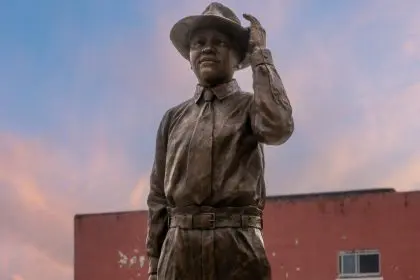How a Southern City Transformed Under Black Governance Since 1974
A City Transformed
In the heart of Georgia, a state historically known for its conservative politics, Atlanta stands as a remarkable exception. For nearly half a century, the city has been guided by Black mayors who have reshaped its identity, economy, and cultural significance. This unbroken chain of leadership began in 1974 with Maynard Jackson’s groundbreaking election and continues today under Andre Dickens’ administration.
Atlanta’s evolution into what many now call the “Black Mecca” didn’t happen by chance. The city’s transformation represents a deliberate shift in political power following years of civil rights struggles. This political renaissance emerged from the tragic aftermath of Dr. Martin Luther King Jr.’s assassination, which served as a catalyst for change in a city that needed to redefine itself.
Maynard Jackson’s Pioneering Legacy
Breaking Barriers
When Maynard Holbrook Jackson Jr. secured 60% of the vote in 1973, becoming Atlanta’s first Black mayor at age 35, he didn’t just win an election – he signaled a fundamental shift in the South’s power structure. Taking office in January 1974, Jackson faced the monumental task of healing a city scarred by racial division while fulfilling his promises to Black constituents who had delivered him to victory.
Jackson’s administration prioritized economic inclusion, implementing groundbreaking policies that required minority participation in city contracts. These initiatives particularly affected the massive expansion of Hartsfield International Airport, now aptly renamed Hartsfield-Jackson Atlanta International Airport in his honor.
Weathering Crises
The Jackson administration encountered significant challenges, most notably during his second term when Atlanta confronted a horrific series of child murders between 1979 and 1981. As homicide rates surged by nearly 70%, Jackson’s handling of the crisis came under intense scrutiny. Many families of victims expressed frustration with what they perceived as an inadequate response, creating a complex chapter in Jackson’s otherwise transformative leadership.
Despite these difficulties, Jackson’s impact on Atlanta’s governance structure proved enduring. His focus on involving Black Atlantans in civic processes and economic opportunities established patterns that subsequent administrations would build upon.
The Young Era: Global Vision
International Connections
Andrew Young’s ascension to mayor in 1981 brought international diplomacy to Atlanta’s leadership approach. As a former U.S. ambassador to the United Nations and close ally of Dr. King, Young leveraged his global connections to position Atlanta as an international business hub.
Young focused on economic revitalization during a period when many American cities faced urban decay. His administration attracted corporate investment while simultaneously working to preserve Atlanta’s cultural heritage. Under Young’s guidance, Atlanta began its transformation into a cosmopolitan center that could compete on the world stage.
The culmination of Young’s international vision came with Atlanta’s successful bid for the 1996 Olympic Games – though the actual event would occur during a subsequent administration, the groundwork laid during Young’s tenure proved essential to securing this global platform.
Complex Transitions of Power
Navigating Growth and Challenges
The administrations that followed Young continued advancing Black political influence while addressing increasingly complex urban challenges. Bill Campbell’s tenure saw significant improvements in public housing and infrastructure but was later overshadowed by legal issues that complicated his legacy.
In 2001, Atlanta achieved another historic milestone with Shirley Franklin becoming the first Black woman to lead the city. Her pragmatic approach to governance resulted in crucial infrastructure improvements, particularly the overhaul of Atlanta’s aging sewage system – an unglamorous but essential project that demonstrated her commitment to foundational city services. Franklin maintained high approval ratings throughout her time in office, further cementing public confidence in Black leadership.
Modern Atlanta: Leadership in Turbulent Times
Crisis Management
The more recent chapters of Atlanta’s leadership story have unfolded against a backdrop of national unrest and global crisis. Keisha Lance Bottoms assumed office in 2018 and quickly found herself navigating the dual challenges of racial justice protests and a pandemic.
Bottoms emerged as a national figure during the Black Lives Matter movement, advocating for police reform while attempting to maintain public safety. Her declaration of Atlanta as a “welcoming city” for refugees represented a continuation of the inclusive philosophy that has characterized much of the city’s leadership over five decades.
When Bottoms chose not to seek reelection in 2021, it marked a significant transition point. Andre Dickens, who now holds the mayoral office, inherited a city grappling with questions about policing, affordable housing, and how to manage growth without displacing long-time residents.
Cultural Influence Beyond Politics
The Capital of Black America
Atlanta’s significance extends far beyond its political leadership. The city has emerged as a cultural powerhouse, influencing music, cuisine, film and television. Its reputation as a center for Black entrepreneurship continues to attract professionals from across the country looking to build careers in a supportive environment.
The city’s vibrant food scene, including its famous chicken wings, represents just one facet of a cultural identity shaped by decades of Black influence. Atlanta’s universities, particularly the historically Black institutions of Morehouse College, Spelman College and Clark Atlanta University, have produced generations of leaders who contribute to the city’s intellectual and cultural vibrancy.
Challenges of Progressive Leadership in a Conservative State
Urban-Rural Divide
Atlanta’s progressive political environment often stands in stark contrast to Georgia’s more conservative statewide politics. This tension has created unique governance challenges, as city leaders must navigate relationships with state officials who may not share their priorities or vision.
Despite these challenges, Atlanta continues to assert itself as a center of innovation and inclusion. The city’s economic growth has positioned it as a counterbalance to more traditional power centers in Georgia, demonstrating how concentrated urban political power can reshape regional dynamics.
The Continuing Legacy
Evolution and Adaptation
As Atlanta approaches the half-century mark of continuous Black mayoral leadership, the city serves as a case study in how representation in governance can transform urban environments. Each administration has built upon the foundations laid by Maynard Jackson, adapting to new challenges while maintaining the central commitment to elevating Black voices in civic processes.
Today’s Atlanta stands as a testament to what purposeful leadership can accomplish. The skyline dominated by the world’s busiest airport, named for its first Black mayor, serves as a daily reminder of how far the city has come since 1974. As Andre Dickens guides Atlanta through current challenges, he does so as heir to a powerful tradition of leadership that has fundamentally reshaped what a southern American city can become.
The legacy of Black leadership in Atlanta remains a powerful narrative of transformation, resilience and progress – an ongoing story of a city that continues to reinvent itself while honoring the visionaries who made its evolution possible.

















